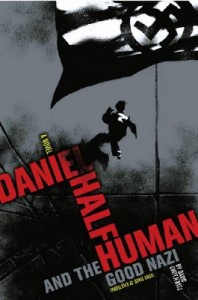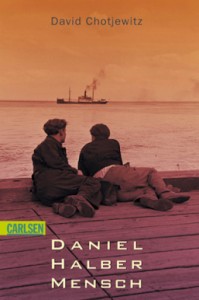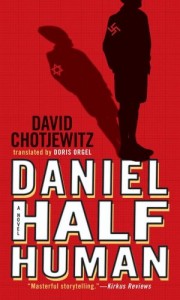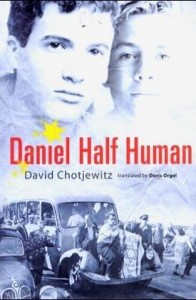I’ve been thinking a lot about how citizens in a democracy come to support extremists in hard times, and whether they understand the consequences of extreme ideas and politicians who consider their opponents enemies deserving of elimination. A recent bestseller, Erik Larsen’s In the Garden of Beasts, tells the story of an American diplomat in Berlin in the 1930s and his daughter who dated some of the rising young stars of the SS. I bought the book and hoped to read it, but my son stopped in for a weekend visit and when he left, the book left with him.
 So instead of In the Garden of Beasts, I picked up David Chotjewitz’s Daniel Half-Human (Simon Pulse, 2006. Trans. Doris Orgel). Originally published in 2004 in the U.S. as Daniel Half-Human: And the Good Nazi, the novel received a Mildred Batchelder Honor Book citation for outstanding children’s books published in translation. Told from a third person omniscient viewpoint, the novel follows friends Daniel Kraushaar and Armin Hillmann from 1933, when they are arrested at the age of 13 for painting swastikas in a working-class neighborhood of Hamburg to 1945, when they meet again at a prisoner of war camp at the beginning of the Allied occupation.
So instead of In the Garden of Beasts, I picked up David Chotjewitz’s Daniel Half-Human (Simon Pulse, 2006. Trans. Doris Orgel). Originally published in 2004 in the U.S. as Daniel Half-Human: And the Good Nazi, the novel received a Mildred Batchelder Honor Book citation for outstanding children’s books published in translation. Told from a third person omniscient viewpoint, the novel follows friends Daniel Kraushaar and Armin Hillmann from 1933, when they are arrested at the age of 13 for painting swastikas in a working-class neighborhood of Hamburg to 1945, when they meet again at a prisoner of war camp at the beginning of the Allied occupation.
Daniel escapes his wealthy, cold parents to visit Armin, who lives in a poor neighborhood near the docks. Armin’s father is a leftist—chronically unemployed, abusive, and an alcoholic. The boys join the right-wing Nazi mob in part to rebel against their parents, in part out of patriotic zeal, in part to have fun. When they spend a night in jail in the chaotic waning days of the Weimar Republic, they slice open their forearms and mingle their blood.
Shortly afterward, Hitler rises to power, supported by a militant plurality of German voters. He and his political allies enact laws restricting Jews. Daniel and Armin’s school reorganizes to give more power to a Nazi teacher; Jewish students are expelled and sent to their own schools.
Then Daniel finds out his mother is Jewish. In the Nazis’ eyes, he is only half a human. In chapters told in third person from the adults’ point of view, his father’s assistant pressures his father to divorce his mother and send her and Daniel out of the country. Daniel’s father, a war hero, refuses. Then Daniel’s uncle is imprisoned and his cousin comes to live with them. Daniel can no longer keep his secret.
In the meantime, Armin joins the Hitler Youth and rises to a position of leadership. When his superiors order him to break off with Daniel, he does so, but he becomes attracted to Daniel’s 100 percent Jewish cousin.
he becomes attracted to Daniel’s 100 percent Jewish cousin.
Chotjewitz, a teacher in Hamburg who published his novel in Germany in 2000, offers a tense, compelling story and a cast of flawed and fascinating characters. There are no heroes here—not the adults and certainly not Daniel and Armin, who regularly make choices without thinking of the consequences. When faced with the consequences of who they chose to support on that fateful day back in 1933, they feel the tug of loyalty to each other but also the instinct toward self-preservation. Ultimately, loyalty, friendship, morality, and all the other values they thought they held mean nothing in the face of a totalitarian monster they helped to unleash. Even Daniel’s final choice, as an officer of the American Army, raises questions of his own guilt and obligation.
Chotjewitz asks young people reading this book today to think. Think before you join a group that engages in mayhem and violence for fun. Think before you condemn those who aren’t like you as enemies or less than human. Think before you pile on those who are smaller and weaker. One day you may, like Daniel, become the victim rather than the one on top.


2 comments for “Daniel Half Human and the Good Nazi”